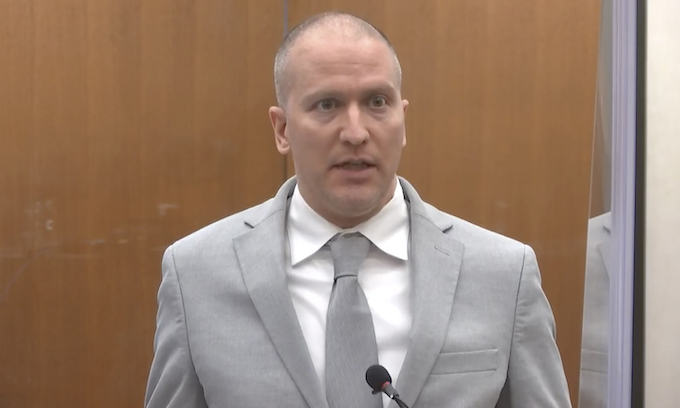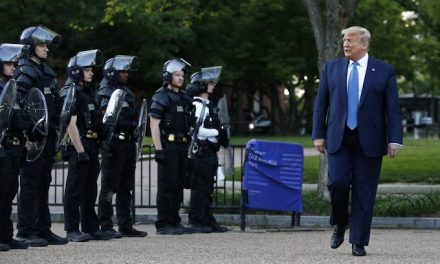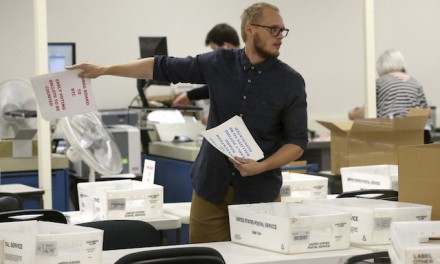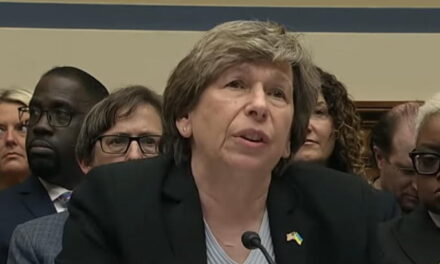Former Minneapolis police officer Derek Chauvin was sentenced Friday afternoon to 221/2 years in prison for murdering George Floyd last year by kneeling on his neck for more than nine minutes.
Hennepin County District Judge Peter Cahill handed down the sentence after hearing victim-impact statements from four members of Floyd’s family, while Chauvin’s mother pleaded for leniency, and Chauvin gave brief and cautious remarks that included expressing his condolences to Floyd’s loved ones.
Chauvin, 45, was taken immediately into custody for him to start serving his sentence. Cahill kept his remarks brief, saying he laid out the basis for the sentence in a court filing based on legal analysis and the facts presented during the trial.
“What the sentence is not based on is emotion or sympathy, but at the same time I want to acknowledge the deep and tremendous pain that all the families are feeling, especially the Floyd family,” Cahill said. “You have our sympathies and I acknowledge the pain that you are feeling.
“It has been painful throughout Hennepin County, throughout the state of Minnesota and throughout the country, but most importantly we need to recognize the pain of the Floyd family.”
Cahill also made it clear that his sentence, coming after many months of sometimes violent civil unrest in the Twin Cities and cities around the United States, was “not based on public opinion. I am not basing it on any attempt to send any messages. The job of a trial judge is to apply the law to specific facts.”
Chauvin’s attorney Eric Nelson had asked for probation and time served, or alternately, less prison time than the 101/2 to 15 years recommended by state sentencing guidelines for someone like Chauvin who has no criminal history. Prosecutors had asked for 30 years, noting that there were four aggravating factors that supported a higher term than outlined by the guidelines.
Chauvin is the second officer in modern Minnesota history to be sentenced to prison time for killing a civilian on the job. Jurors convicted him on April 20 of second-degree unintentional murder, third-degree murder and second-degree manslaughter. Chauvin was sentenced on the second-degree murder count. The offense carries a maximum prison term of 40 years, which is rarely given.
Former Minneapolis police officer Mohamed Noor was sentenced in 2019 to 121/2 years in prison on second-degree murder for fatally shooting Justine Ruszczyk Damond while responding to her 911 call about a possible sexual assault in an alley.
Minnesota Attorney General Keith Ellison was expected to hold a news conference in the courthouse, which is closed to the public, 15 minutes after Chauvin’s sentencing hearing ends. Floyd’s family, their attorneys, including civil rights lawyer Benjamin Crump, and the Rev. Al Sharpton were expected to make a public address outside the courthouse afterward.
After Floyd’s family and the prosecution spoke, Chauvin gave brief remarks before hearing his sentence.
“At this time due to some additional legal matters at hand ,I’m not able to really give a full formal statement at this time,” said Chauvin, dressed in a gray suit and his head closely shaven. “Briefly though, I do want to give my condolences to the Floyd family. There’s gonna be some other information in the future that would be of interest, and I hope things will give you some peace of mind. Thank you.”
The first victim impact statement came from Floyd’s 7-year-old daughter, Gianna, who said via remote video that “I ask about him all the time.”
In response to questions from an adult off-camera, she said she wants to know, “How did my daddy get hurt?” Asked what she would tell her father when she sees him again someday, she said: “It would be I miss you and I love him.”
Floyd’s nephew, Brandon Williams, was next, and said the family’s pain was unimaginable, but not as unimaginable as what Chauvin did to Floyd.
“You may see us cry but the full extent of our pain and trauma will never convey the pain we have suffered,” Williams said. ” … George’s murder, this trial and everything in between have been tragically devastating. Our family is forever broken and one thing we cannot get back is George Floyd.”
Brother Terrence Floyd followed, consumed by emotion and said, “Over this last year and months I actually talk to a few people. I wanted to know from the man himself, ‘Why? What were you thinking? What was going through your head when you have your knee on my brother’s neck, when you knew that he imposed no threat anymore while he was handcuffed. … Why did you stay there?”
The brother said he spoke with George Floyd on the phone about a month before the death on May 25, 2020, “and we had a long conversation. … He wanted to have play dates and plan play dates with Gianna and my daughter. We started to set that up. That can’t happen.”
He said that when the time comes for him to tell his daughter what happened, that will be “hard than even to stand here.”
As for Chauvin’s punishment “we seek the maximum penalty. We don’t want to see smacks on the wrist. We’ve seen that already.”
Another brother, Philonise Floyd, closed out the family’s statements, saying, “I began to speak to the world for George for the United Nations, Africa, Canada, Japan and so many other countries. Everyday, I have begged for justice to be served for the execution of George, while others begged and pleaded for George to take a breath.”
He closed by saying, “George’s life mattered, so my family — and all most of all my niece Gianna, she needs closure. I’m asking that you please find it … to give officer Chauvin the maximum sentence possible.
“My family and I have been given a life sentence. We will never be able to get George back. … He will never be able to walk Gianna down the aisle at her wedding.”
Prosecutor Matthew Frank pressed for a sentence well above what state guidelines recommend but first thanked Minneapolis police officers for coming forward to testify, not hiding behind the “blue wall of silence. He said the state Bureau of Criminal Apprehension went “above and beyond the call of duty” in investigating Floyd’s death.
Then he thanked the loved ones and friends of George Floyd.
“They have been through so much more than families involved in murder cases. It’s a fraternity you don’t want to be a part of, but they’ve been through so much more because of pandemic, because of security, and safety precautions they have to take. They have been though a lot,” Frank said. “I thank them. They have been models of grace and understanding, and it’s really remarkable, quite frankly.”
Frank walked through the four aggravating factors, starting with the fact that Chauvin was in a position of authority as a police officer.
“This case wasn’t about all police officers; it wasn’t about policing, this case was about Derek Chauvin disregarding all that training he received and assaulting Mr. Floyd until he suffocated to death,” he said. Regarding that Floyd’s killing involved particular cruelty, another aggravating factor, Frank said: “I think torture is the right word.”
Frank then went through each of the four aggravating factors that Cahill affirmed that could lead to Chauvin’s sentence topping state guideline recommendations.
The prosecutor said Chauvin employed “a particularly aggressive use of force. … I think torture is the right word.”
He said Floyd “was suffocated, there’s no other way to say it. It was particularly cruel … this 91/2 minutes of cruelty to a man who was helpless and begging for his life.”
Speaking specifically about what the sentence should be, Frank said to the judge that the defense’s argument for probation is “so outside the realm of possibility. This is murder.”
He then called for a 30-year prison sentence for Chauvin, double what the guidelines call for.
Chauvin’s defense began its arguments for leniency with a statement from his mother, Carolyn Pawlenty, who told the court: “When you sentence my son, you will also be sentencing me.”
“Derek devoted 19 years of his life to the Minneapolis Police Department. It has been difficult for me to read and hear what the media, public and prosecution team believe Derek to be an aggressive, heartless, uncaring person. I can tell you that is far from the truth,” she said, before addressing him and recalling that her happiest moment other than giving birth to him was pinning his police badge on him upon becoming an officer.
“My son’s identity has also been reduced to that as a racist,” she said in her first public comments since Floyd’s death. “I want this court to know that none of these things are true and my son is a good man. … He has a big heart and always put others ahead of his own.”
Pawlenty said she believes in her son’s innocence, and “I will never waver from that.”
Eric Nelson then made a plea that mitigating factors be taken into consideration when sentencing Chauvin.
“As I believe we are all cognizant of this case is at the epicenter of a political and cultural divide,” Nelson said, adding that he has received thousands of emails and voicemails. “The impact that this case has had on this community is profound it goes far beyond what happened on May 25 of last year, it has been at the forefront of our national consciousness and has weaved its way into nearly every facet of our lives from the entertainment that we consume to presidential politics.”
In a two-page order issued Friday morning, Judge Peter Cahill rejected defense attorney Eric Nelson’s motions before Chauvin’s sentencing is scheduled to begin at 1:30 p.m. Chauvin, 45, will be sentenced on one count of second-degree unintentional murder. Jurors also convicted him on April 20 of third-degree murder and second-degree manslaughter.
Nelson had argued in a May filing that Chauvin should receive a new trial because of prosecutorial misconduct, judicial error and impropriety by jurors. He also requested a Schwartz hearing, a proceeding in which jurors are recalled to court and questioned about possible misconduct.
Nelson’s filing came after juror Brandon Mitchell went public about his role in the case, prompting many commentators to criticize him for attending last August’s 57th anniversary of the March on Washington to commemorated Martin Luther King Jr.’s “I Have A Dream Speech” and included events rallying support for police reform and featuring Floyd’s family members, among others.
Nelson also wrote that Cahill abused his discretion by denying Chauvin’s request for a change of venue before trial began, rejecting a previous request Nelson made for a new trial, failing to sequester jurors for the entirety of the trial and refusing to compel Floyd’s friend to testify at trial.
The second-degree murder count carries a statutory maximum term of 40 years in prison, but state sentencing guidelines call for between about 10 1/2 and 15 years for someone like Chauvin who has no criminal history. The presumptive term for the offense is 12 1/2 years.
The sentencing was livestreamed as was Chauvin’s six-week trial that began March 8.
Mitchell Hamline School of Law Prof. Ted Sampsell-Jones said Cahill was under “a lot” of public pressure to give close to 30 years.
“Part of what a judge is trying to do is accomplishing deterrence and sending a message … and that does take into account the impact on the community,” Sampsell-Jones said earlier this week. “We have important factors in play that have never been in play before.
“This is a Minnesota case that has received national and international attention unlike any other case in Minnesota. It’s a case where the threat of violent response has hung over the entire proceeding. That’s highly unusual. You can’t deny that those things matter. You can’t deny that they have shaped the proceedings at certain points.”
The Hennepin County Government Center, where Chauvin will be sentenced, and which houses county government offices and Hennepin County courts, was closed to the public Friday. County appointments have been moved to other locations, according to county officials. Jury trials that are in progress suspended activity Friday, and other hearings that day are occurring remotely, according to court officials.
Unprecedented security measures were in place during Chauvin’s trial: courthouse access was limited to trial participants and a few employees; concrete barricades, fencing and barbed and razor wire were ringed the building and county jail; and armed National Guard members and sheriff’s deputies were stationed outside and inside. Gov. Tim Walz said there was no request for state assistance.
Star Tribune staff writer Jessie Van Berkel contributed to this report.
(C)2021 StarTribune. Visit startribune.com. Distributed by Tribune Content Agency, LLC.
—-
This content is published through a licensing agreement with Acquire Media using its NewsEdge technology.



















“I want to acknowledge the deep and tremendous pain that all the families are feeling, especially the Floyd family,” Cahill said. “You have our sympathies and I acknowledge the pain that you are feeling”. The family feels great pain for a low life criminal, drug head.
AND what of the PAIN AND SUFFERING THE Hundreds of thousands of REGULAR CITIZENS have felt, from the YEAR+ long RIOTS by BLM??
“What the sentence is not based on is emotion or sympathy, but at the same time I want to acknowledge the deep and tremendous pain that all the families are feeling, especially the Floyd family,” Cahill said. “You have our sympathies and I acknowledge the pain that you are feeling.”
“I am not basing it on any attempt to send any messages. The job of a trial judge is to apply the law to specific facts.”
BS. There is far more to say than I can say in this limited amount of space. This is a travesty of justice akin to the O J Simpson trial. While the loss experienced by the Floyd family is sad, George was deified and placed just one step below Jesus Christ. His family have become Media stars and millionaires. A statue of George has been erected while so many others have been torn down. Opportunists in the right place at the right time exalted by Media sensationalism, Liberal politics, and cultural and societal upheaval. Justification—not justice.
Saint george will be remembered by half of the country as a victim of systemic racism and police brutality. The other half of the country will remember him as a drug addicted criminal thug, who brought about his own demise through drug abuse, and fighting the police after passing counterfeit money at a convenience store. Which of these pictures is more accurate?
I call bull too.. HE IS DEFINITELY DOING this to send a message, JUST LIKE HIS other unlawful rullings..
You would have to go to North Korean or Red Chinese court rooms to find a miscarriage of justice this egregious, The sentence for what is almost certainly not murder but an accidental overdose of two drugs is twice as long as any that has ever been imposed for this supposed offense before, and comes after shocking misconduct by our Chinese puppet president and the melanotic madwoman from California, who openly called for violence for a not-guilty verdict. There may yet be riots because Officer Chauvin was not torn apart by dogs in the courtroom like a disgraced relative of Kim Jong-un, but it is more likely that he will not survive 22.5 minutes in any American prison controlled by black militants, which is to say almost all of them. If a new trial is ordered that is not contaminated by Hitlerian judicial misconduct, the already-orchestrated riots may yet be unleashed; otherwise the “peaceful” looting, burning, rape and killing will occur the next time a policeman does not drive a perpetrator from a favored racial group home from the scene of the crime and thank him. Down with the dictatorship! Biden and intentional crime wave delenda est!
(sigh . .) This punk in a police costume gave the bad guys and their Democrat backers the excuse they needed to translate black violent criminals into victims of the “man”. Now the poster children that we have witnessed as justification to go on a violent crime spree. ALL have extensive history of hurting others and now set into motion the rallying cry that Obama and his minions now celebrate. Congratulations –and accusations to the Democrat party that is guiding this.
SO where are his APPEALS at??!
Why? He didn’t kill anyone.
I didn’t see this guy shove the drugs down Floyd’s mouth to cause the OD, did you?
Maybe we SHOULD do that, to drug dealers, smugglers and cartel members… OD THEM ON THEIR own poison.
Floyd died of an overdose of several drugs. The police officer may have over reacted to Floyd’s resisting arrest, but that is not what killed him. I hope this miscarriage of (so called) justice can be overturned.